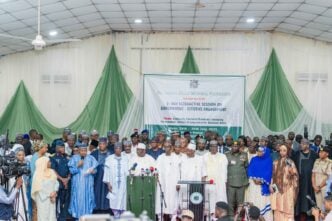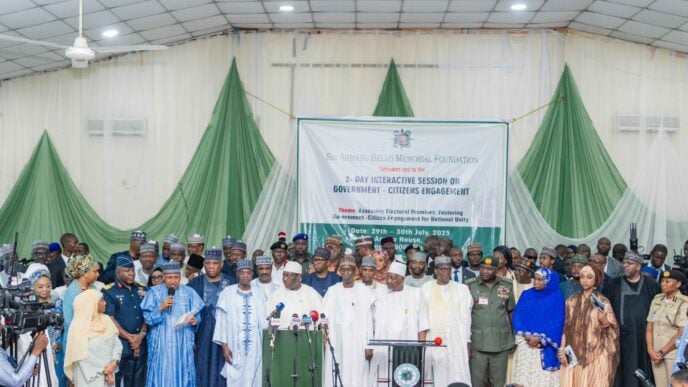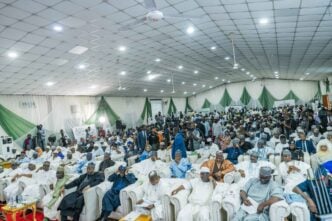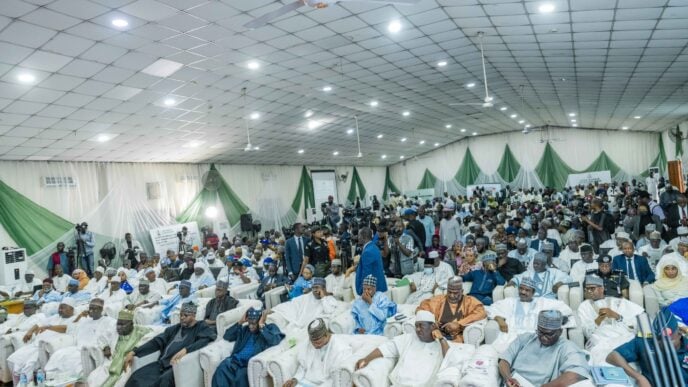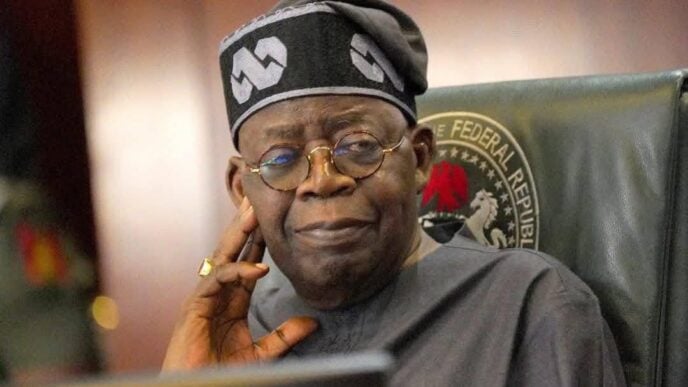Nigerian youths on a road show
Falling in love with a Nigerian is not for the faint-hearted. Sissies need not apply. It requires patience, a tolerance for contradictions, and pretty much everything 1 Corinthians 13 recommends. And that’s just the bare minimum. But if you’ve ever loved a wasp, a cockroach, a scorpion, or a butterfly—this will be easy.
Now, I understand how absurd that sounds. Some of you—my African brothers and sisters—have told me in hushed tones:
“We like you Nigerians, but… sometimes… It’s too much.”
Yes. We know. Our wahala is too much.
Advertisement
Ghanaians sigh, “Charlie, dey don come,” when we enter a room. South Africans roll their eyes and mutter, “Eish.” Kenyans try to keep up with our speed and volume, saying, “Haraka, haraka haina baraka.” Libyans, still haunted by our presence, try to enslave us. And when they can’t, they kpai us.
I’m sure you know what kpai means by now. It’s one of the many new words we’re lending to the English dictionary.
And honestly, I don’t blame you for feeling the way you do. If I were in your shoes, I probably would too.
Advertisement
What am I even saying? I’m a full-blooded Nigerian—and even I once struggled to understand Nigerians.
That was until I reread James H. Otto and Albert Towle’s Modern Biology—the same secondary school textbook I once skimmed for diagrams of reproductive organs in between learning how to draw the grasshopper. (Look, we didn’t have Playboy magazines in the village where I grew up. Boys had to improvise.)
That textbook unlocked the secret to understanding Nigerians somewhere between the photosynthesis and human anatomy chapters.
You see, Modern Biology did something neither the Bible nor the Quran managed: it explained human behaviour… using insects.
Advertisement
If I ever get the time, I’ll rewrite those chapters and call it “The Gospel According to Insects.”
In that book, every insect—no matter how annoying—had its own section, complete with a paragraph titled “Economic Importance.”
That’s how I learned cockroaches play a role in the ecosystem despite being the unpaid extras in every Ajegunle kitchen drama.
That scorpion that stung me when I was six? It wasn’t evil. It was just doing what a scorpion does: protecting itself like a Nigerian trader selling slippers in traffic on 3rd Mainland Bridge—or love on eharmony.com—sharp, sweet, defensive, and not afraid to sting.
Advertisement
The wasp? Loud, colourful, aggressive, unpredictable—but it pollinates. You just have to survive the buzzing and the sting if you stray too close to its nest.
Even the mosquito, destroyer of sweet night dreams and reliable malaria distributor, had a column justifying its “contribution” to the food chain. And a historical fact many of you Africans may not know, the mosquitoes also helped drive the Europeans out of Africa. So, it was not just Jomo Kenyatta, Kwame Nkrumah, Patrice Lumumba, Samora Machel, Leopold Senghor, and other independence heroes who fought; mosquitoes also had their airborne battalions.
Advertisement
I mean—imagine defending malaria’s parasite vector with ecological purpose. That’s Nigerian logic in a nutshell.
So, who is the Nigerian in the Insect Kingdom?
Advertisement
The Nigerian is a composite species—equal parts cockroach, scorpion, wasp, mosquito, and butterfly.
We are resilient like the cockroach. We thrive in chaos and adapt to anything. Set traps for us—we’ll sniff the crayfish you used as bait and walk the other way. Spray insecticide? We build immunity. Crush us halfway? We recover. And even when you kill one, it has already laid the eggs. We reemerge.
Advertisement
We are defensive like the scorpion. Leave us alone, and we’ll mind our business. But poke us near the rocky places we call home—and we sting first, ask questions later.
We are as busy as wasps. While you relax, we hustle. You might not like our tone, but we’re getting things done—and posting and boasting about it on social media. We can’t help it. We’re cursed like that.
We are irritating like a mosquito. Loud, persistent, always in your business—especially in traffic or on Twitter (sorry, X). But don’t forget: as larvae, tadpoles feed on us. And when they become frogs, they keep munching. Because they feed on us, you are spared. We’re part of the circle of life, no matter how annoying we are.
Some of you see only our caterpillar stage—rough, hungry, greedy. But wait until we become butterflies. That’s when we shine. We shine globally—as doctors in your hospitals, engineers in your factories, technologists in your fintech startups, judges in your courts, nurses by your bedsides, actors on your TV screens, and teachers in your classrooms.
Once I started seeing Nigerians this way—through their biological function—I began to understand them. And even, somehow, love them.
Mind you, we didn’t just arrive like this.
The modern Nigerian you see today is a product of evolution. We were re-engineered by police brutality and military oppression, fanned by fuel scarcity, cooked by corruption, trampled by tribalism, and boosted daily on Big Brother Naija, skit comedy, Nollywood witches and wizards, and “No Turning Back,” praise worship.
Our species descends from the same ancient stock as yours. Over 3,000 years before Christ, the Bantu expansion swept across Africa, bringing population shifts, genetic mixing, and culture clashes. That history—if your country still teaches it—tells you how we all became what we are.
History hasn’t ended, no matter what Francis Fukuyama believes each time he downs a cup of ogogoro.
The Nigerian of today is a new breed entirely. We are genus Naija sapiens.
Loud like Portable, suspicious like Burna Boy, joyful like Davido, cynical like Wizkid, prayerful like Indaboski, entrepreneurial like Don Jazzy and absolutely addicted to drama like Naira Marley.
Wherever two or more Nigerians are gathered, there will be: twelve business proposals, thirteen conspiracy theories, fourteen people speaking in tongues, and at least one lady “going for somebody’s son” while another is looking for her Johnny.
We are exhausting. We know.
But like the insects in Modern Biology, we play a role in the African ecosystem. We bring energy through entertainment, hustle culture, or exporting both our jollof and our chaos. We don’t just stir the pot.
We are the pot.
Here is a note to our fellow Africans.
I’m sure some loud-mouthed Nigerians have told you that you’re small compared to us, the “Giant of Africa.”
Don’t get mad. Inside, when we’re alone, we call ourselves “big for nothing.”
And if someone’s told you your resentment is just juvenile jealousy—ignore the fellow. We have brain damage. Beneath the bravado, many Nigerians are scared. Scared of the scars of our upbringing, the trauma of our teething years, the scarcity that shaped us, and the fear that it might never end.
The day I feared Nigerians the most was in the ’90s, at a student gathering in Norfolk, Virginia. One beautiful Kenyan girl, playing hard to get, brushed off a Nigerian guy. His response?
“I didn’t come to America to date a Kenyan.”
It was petty. It was unnecessary. It was Nigerian.
We can be that mean—especially when we feel made small. As Gaise Baba sings in “No Turning Back,” we have gone too far. It’s already too late. We will never turn back. It won’t make sense.
Here is the final lesson: Love the beast, not just the beauty
To fall in love with a Nigerian, you must first abandon logic. You don’t study a Nigerian—you experience one.
We are not easy to understand. But neither is the wasp. Or the cockroach. Or the scorpion. Or even the butterfly. And yet… they all have economic importance.
So, the next time a Nigerian leaves you baffled, offended, entertained—or all three at once—just reach for your copy of Modern Biology. Flip to the chapter on insects. And remember:
Everything has a purpose: even us, the Nigerians.
Rudolf Ogoo Okonkwo teaches Post-Colonial African History, Afrodiasporic Literature, and African Folktales at the School of Visual Arts in New York City. He is also the host of Dr. Damages Show. His books include “This American Life Sef” and “Children of a Retired God.” among others. His upcoming book is called “Why I’m Disappointed in Jesus.”
Views expressed by contributors are strictly personal and not of TheCable.





